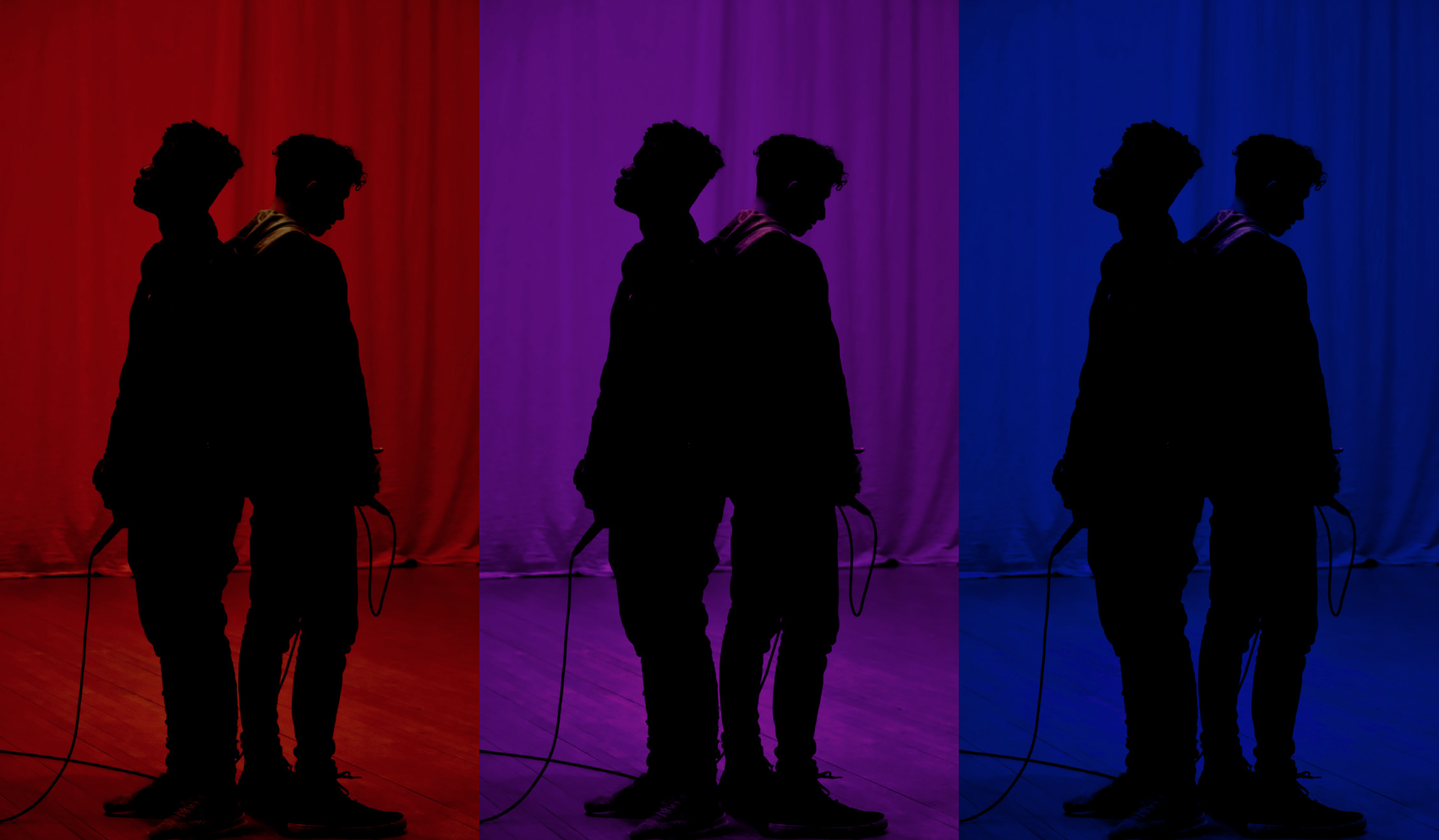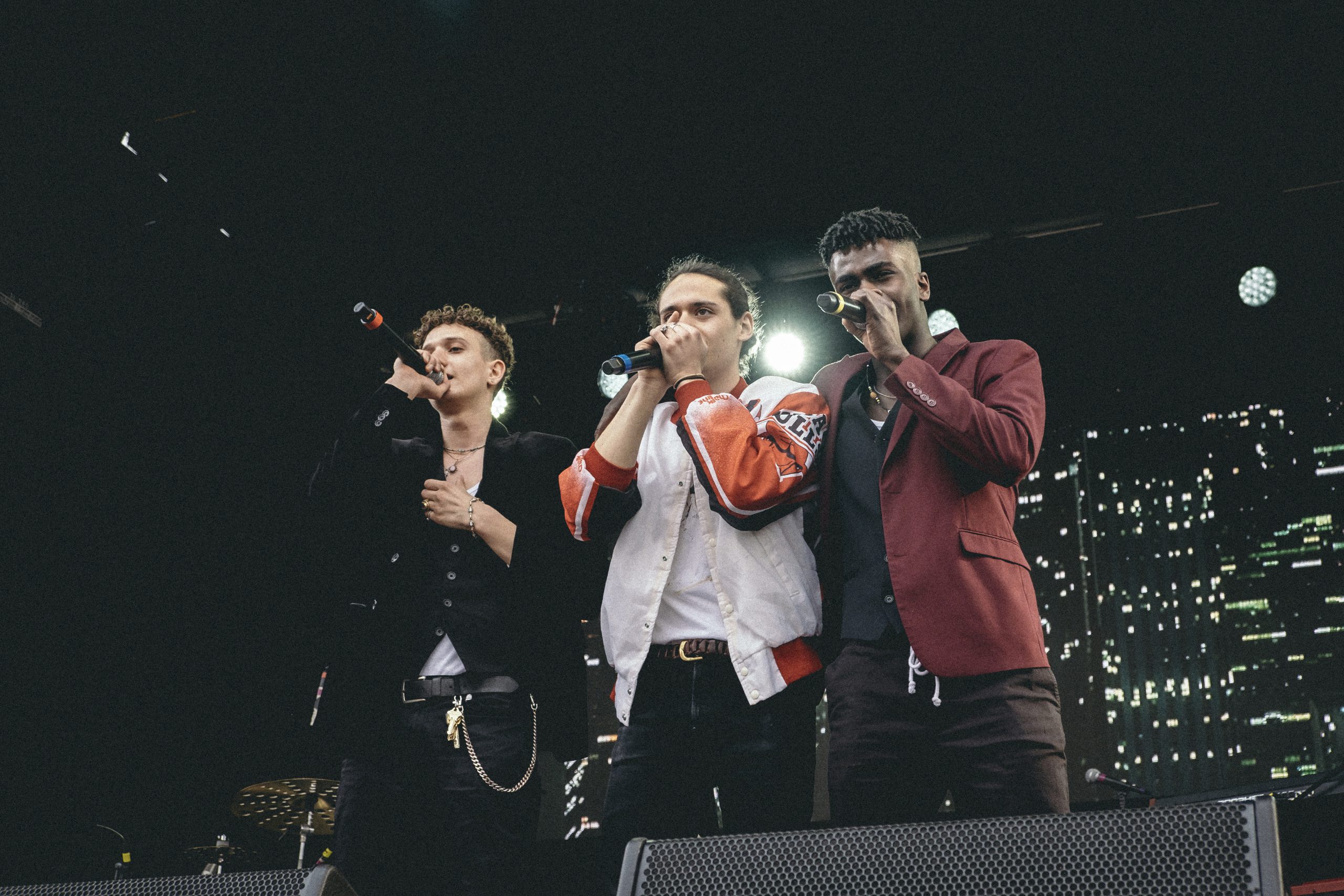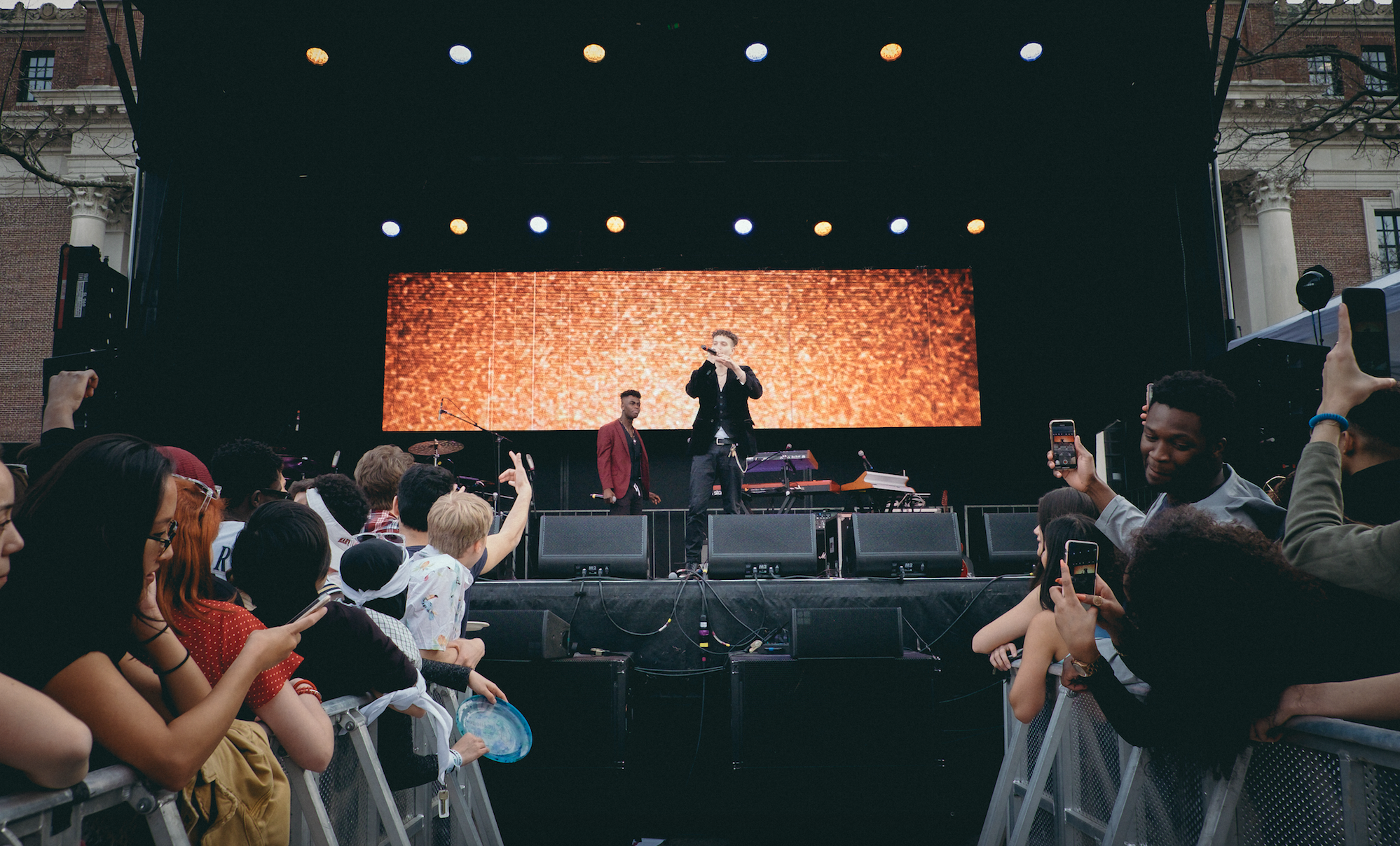Upon arrival, I wondered if I had found the right place. In the main room of the Signet Society, some 30 people were gathered on chairs and couches watching a fellow student perform jazz. Within the walls that artists from T. S. Eliot to Robert Frost to Yo-Yo Ma inhabited during their time at Harvard, this performance seemed well-situated. Looking at the ornate gold frames and false Roman columns, however, it felt odd that Harvard’s most-celebrated rappers would soon perform here.
Lincoln Hart was the first on stage. By day, he is a sophomore at Harvard, but that night he was just “Lincoln,” the eponym he uses professionally. Like the earlier performers, he began seated at the piano, tapping the pedals with his white oxfords as he sang the velvety “Up Late.” As he continued down his setlist, however, the atmosphere began to transform; transitioning to the higher-intensity track “Palace” and eventually to freestyle, he moved from the piano to his Macbook to a red electric guitar. When he broke into a shutter-inducing riff over the low-fi track bumping out of his computer, one felt that they were seeing Lincoln in his truest form: defying genres, dripping with emotion, and encapsulating a near-silent audience.
It was Michael Osei, who goes by “MJangles” in a nod to 20th-century African American entertainer Bojangles, who brought the crowd to its feet. After trying out a new track he had written the night before, he moved to a call-and-response:
“Twelve, 12, 12, 12, call the five-o …”
Three seconds passed: “No!”
Then, he drew everyone close, forming a circle around him while Lincoln continued to play the beats from his computer, which rested on top of the piano. He bounced between the crowd members rapping “H.U.I.D.” in a scene that seemed better suited to a low-lit club than to this grand room.
The Signet’s walls are lined with the dried roses given to some of its most famous alumni when they were initiated into the society as undergraduates. Harvard is famed for those names on the wall — for presidents and poets and cellists, but surely not for rappers. But watching Lincoln and MJangles perform, one is forced to ask: Why shouldn’t it be?
Origins
Osei was born in Adukrom, Ghana, but moved to the United States after his father, a prominent pastor, found new work in The Bronx. Osei was three at the time, but he still remembers those first few years as difficult ones.
“I grew up in a household dominated by domestic abuse,” he explained in an interview with the HPR. “My dad was just an extremely violent person. He beat up my brothers and my mom. Me, not as much because I was super young, but sometimes.”
After several years of abuse, Osei’s mother began to speak out. Fearing the implications of her allegations, especially considering his role as a religious leader in their community, his father fled. It has been over a decade since then, and Osei has not been in contact with him.
Things began to change for Osei at the age of 10, when he was accepted to Prep for Prep, an organization that offers promising young students of color in New York City access to private education in the city’s highly competitive prep school network. He enrolled at St. Bernard’s in Manhattan before moving to Groton, a boarding school in Massachusetts, for high school.
For most of his life until that point, he had listened to rock music — “like Linkin Park and Breaking Benjamin,” he laughed. One day in high school, though, his friends asked him to freestyle with them. The fire was lit; before long, he was writing his own songs and working with other young musicians from school. By senior year, he had decided to pursue music professionally.
Hart can relate.
“When I got to high school, it was actually the white kids that were like, ‘Yo, let’s freestyle. You’re probably nice at it!’ And I was like, ‘alright,’” he told the HPR. “I was actually nice at it — I was nicer than all of them at least, not that nice. But they were all hype, because they had a friend who could freestyle now.”
Hart grew up between upstate New York with his mother and New York City, where his father moved after they separated. He has always been involved with music; he recorded his first album when he was nine years old — “It was all like, acoustic guitar shit, singer-songwriter stuff” — and plays guitar, piano, drums, and bass. He also joined the jazz program at his school in the city, where he had moved full-time for high school. It was then that he began rapping and producing his own music.
He cites his family history as a central inspiration for his music; his mother grew up in a poor Russian immigrant family in Brooklyn before eventually making it to the New York City Ballet, and his father — a descendant of South Carolinian slaves — grew up in the City too, eventually becoming a psychologist working on matters of race and inclusion. This background also inspired his academic success throughout high school.
“I grinded to get into Harvard, because I wanted everyone to know I was smart, that my family was smart,” he explained. “My father is very brilliant, but he didn’t have the resources I had growing up to make a place like Harvard possible. Same thing with my grandfather … racism, in my mind, kept some of the most brilliant people that I know out of higher education. I just wanted to reclaim that shit. I didn’t really give a shit about Harvard in terms of what it meant to go here or be here. I wanted the Hart last name — which is a slave name — to be written in the books of admitted students.”
After being admitted to Harvard, Hart was surprised at how despondent he felt. In the eyes of his peers he had made it, but he could not help but feel unsatisfied. After that, he began considering a career in music more seriously.
Biking
One verse appears in two tracks on Velox Oculus, Lincoln’s debut project: “I take my bike on the freeway/I take my bike to the store/Dodging the traffic is easy/I’m always cutting it close/ But fuck if it hits me so be it/Fuck if it hits me I’m gone/All of the tires keep spinning/All of the world moves along.”
It is an ode to Corbin Carr, a fellow Harvard admit Hart met at a New York City meetup for accepted students. The two were beginning to form a friendship when Carr was hit by a truck in Hell’s Kitchen while biking home from his girlfriend’s house. He was pronounced dead on arrival at the hospital shortly thereafter — just two months before he would have enrolled at Harvard.
“This wasn’t my best friend,” Hart explained. “It was the potential for a new friend. In some way I thought that our lives were kind of parallel. Everything just kept existing, and when I got here no one else knew anything about him. It’s like I was seeing a ghost.”
This event forced Hart to reflect on his own dissatisfaction with the path that appeared to be expected of him now: an Ivy League education, a high-paying job, and the typical lifestyle of the American elite. Faced with this brutal reminder of his own mortality, it became clear to him that he needed to put his true passion, music, at the forefront of his life. One minute he could be biking, his whole life ahead of him, and the next it could all be over. “Because all of the world moves along,” he trailed off.
Ivy League
Before arriving at Harvard, Osei was told to keep his eye out for Hart by a mutual friend from New York. When they met during their first few weeks at Harvard, they freestyled for one another. They had both grown accustomed to being connected to so-called ‘rappers’ who lacked real talent, but when they heard each other rap, the connection was instantaneous.
When asked how their musical endeavors fit in with the rest of their Harvard experience, Osei was quick to interject: “I would probably frame it more like, how does it clash, rather than how it fits in.”
“It feels like it’s in direct opposition, often,” Hart added.

Osei and Hart, photographed by Julianna Kardish.
That Harvard is not the ideal environment to launch a rap career should come as no surprise. As undergraduates at one of the most competitive universities in the country, Osei and Hart must keep up with classes, homework, and exams — not to mention other extracurricular obligations and social commitments.
“To me, it feels like there are so many responsibilities that are put on me that are specifically tailored to ‘Harvard world,’” Osei said. “And then I have my world — the world of my family, my friends, and my music.”
Sometimes, however, these worlds can collide. During their first year, the duo built up a reputation around Harvard Yard as “the kids who were super nice at freestyling.” Only a month or so into the year, other students began to show up at Osei’s room in Holworthy Hall to ask the pair to rap for them. That performance would undoubtedly end up on someone’s Snapchat story, and a larger crowd would show up the next weekend.
That summer, they each released their debut projects: MJangles’ “Product of Environment” and Lincoln’s “Velox Oculus.” After that, they were no longer seen as amateur freestylers; as their audience grew, their listeners began to see them as real musicians. They traded Osei’s dorm in Holworthy for bigger venues, began attracting larger crowds, and started hosting more official events. And as they have moved up in the world, their Harvard classmates and friends have been some of their biggest fans.
“In February, I was hanging out with this girl, and we had a show coming up,” Osei recalled. “She [told me that our shows] have played a big part in bringing members of our class together, because it’s something we can look forward to, get hype for …”
Hart interjected: “And it’s not exclusive! We purposefully want every person from every place … and we end up getting a very strange mix of people at some of these shows, which is great. It’s a lot of love that we feel and we give back — which is kind of a rare thing here.”
Inclusive spaces are hard to come by at Harvard. At a university defined by its exclusivity, where students participate in months-long processes just to gain membership in social groups and parties are restricted by bouncers with lists, their shows provide a rare opportunity for students from across campus to come together. Osei and Hart appreciate the support they have received from their peers, even if it took a while for their classmates to take them seriously.
“We’ve proven to our classmates that as brilliant as they are at what they do, we’re the same with our music,” Hart said. “And I think that they’ve come to see and respect that.”
H.U.I.D
As black students at a university that once owned slaves, Osei and Hart contribute to the ongoing struggle for Harvard to move on from its discriminatory past. Upon admission, their class was record-breaking: the first ever in Harvard’s history to be majority non-white. Alongside their other non-white peers, their very presence indicates a deviation from the problematic practices of an older Harvard. But despite this gradual diversification of Harvard’s student body, students of color continue to face institutional and contextual barriers. Just last year at Yardfest, the University’s annual spring concert, an event of alleged police brutality against a black undergraduate reminded students of the work that has yet to be done. This year, the duo won a competition to perform as openers at that same event.
“My experience as a black person at Harvard is naturally connected to my experience as a black person in life,” Osei explained. “Race definitely plays a part in the lyrical content that I offer, but I have only written one song about my experience with race at Harvard.”
That one song — “H.U.I.D.” off of “Product of Environment” — directly references the episode of police brutality. Osei uses the event as a window to reflect on his own experience as a once-excluded minority at an Ivy League university. Overall, however, both artists agree that their experience of race at Harvard tends to mirror their larger experience of race in the United States. Being black in white-dominant spaces comes with challenges to begin with, but being black rappers in those spaces has brought unique challenges of its own.
“I think there is a certain aspect of, ‘Oh, it’s the black people who are going to entertain us now,’” Hart reflected. “And that’s not just in music; we dance at parties, and we carry ourselves with a certain energy. We speak a certain way, we dress a certain way. And although it seems like people really take to it, there’s definitely an element of, ‘Oh, you have that black thing that is so poppin’ right now. Can you do it for us again?’”
The attention can be positive, but it can also be problematic. The line between being appreciated as people and being enjoyed as performers is fraught, which can be isolating. Sometimes Hart wonders, “Do you genuinely care about the people we are?”
Maybe There’s Life
Along with third member Tobias Defoe, Hart and Osei formed the trio “Maybe There’s Life,” which they describe as their collective, their record label, their brand, and “the future.” “We’re trying to start Facebook,” Hart said. “Maybe There’s Life, Lincoln, MJangles. These are brands that have potential that is impossible to calculate. We really believe in what we do, and we know that this is what we’re doing with our lives.”

Maybe There’s Life performing at Yardfest, 2019.
In the long term, they hope to partner with another label that has distribution, and even to sign other artists to their own. Their overarching goal — to create a movement within the industry that puts the power back into the hands of artists, rather than “execs” — is lofty. But they also know there can be strength in numbers. By combining their varied talents and sounds, they hope to maximize creative control when they eventually begin negotiating with labels. Considering the long legacy of chart-breaking rap groups and collectives, from N.W.A. to A Tribe Called Quest to Odd Future, it is a promising strategy.
At the time of the interview, they were hesitant to give much away about their upcoming project, “Harlem Nights” — “We don’t want to jinx it.” Their excitement, however, was palpable. It came out two weeks later on April 13, showcasing their collective power as Maybe There’s Life’s first major collective project.
“We had a certain kind of attitude about it,” Hart explained, “that was just like, ‘Fuck all the conventions, all the rules. Fuck everyone who thinks that their shit is the dopest, fuck all the labels.’ I had just come off of a really disappointing meeting with [the CFO of ] Atlantic Records — I thought we were all getting signed. But they were only paying attention to artists … who were doing shit that sounds like everything that’s already popping.”
The result is a genre-bending product, one that Osei believes will be “a landmark in music history.” Bringing his rap prowess together with Hart’s diverse musical abilities and producing skills, the project promises to inspire imitation.
“That’s the beauty of it … we’re coming for convention, for the rules about how you have to do music,” Hart said.
It’s Over Now
As they do at the end of every show, Hart and Osei joined each other at the mic to finish their set. Osei rallied the crowd out of its seats, and audience members joined him at the front of the room. Hart put on the track, and the closer began: “It’s over now, it’s over now/When they both come out, oh it’s over now/ When the lights come on, ‘til they close it down/They gon’ know us now, ‘cus it’s over now.”
As they traded off their final verses, the wooden floorboards of the Signet creaked beneath the audience members, who now moshed and cheered them on center-stage. There was an undeniable feeling that history was being witnessed with every verse. In a building designed for poets and classical musicians, Lincoln and MJangles delivered the soundtrack of a changing Harvard — one where students of color occupy the majority, where histories of exclusion are dismantled, and where even rappers come to study.
Image Credits (in order of appearance): Campbell Erickson, Julianna Kardish, Campbell Erickson
